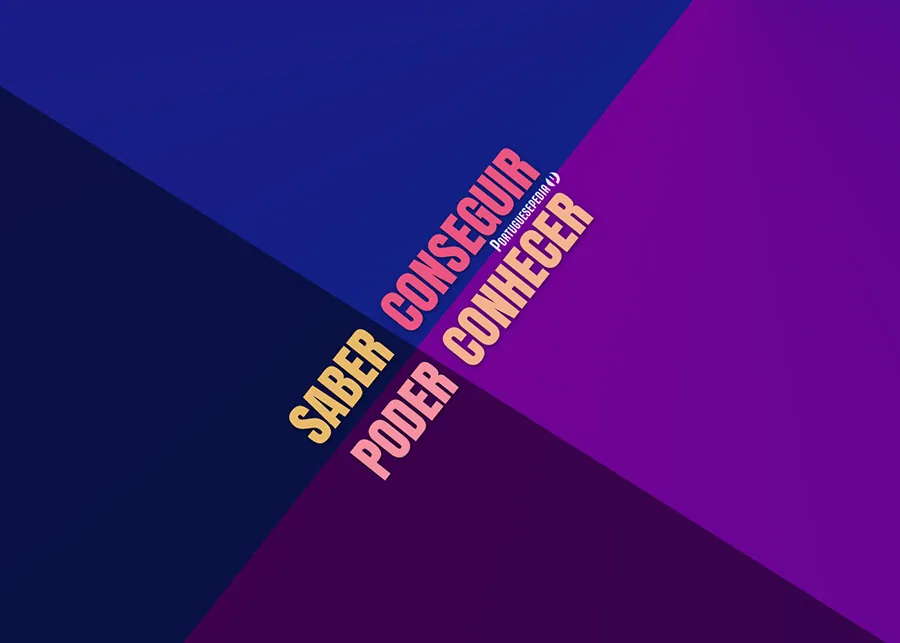
Portuguese Tricky Verbs: Saber vs Conseguir vs Poder vs Conhecer
There’s a lot of confusion around the following Portuguese verbs: Saber, Conseguir, Poder, and Conhecer.
That’s most likely the case for anyone using English as a reference while learning Portuguese. Why?
When in English we use the verb Can, in Portuguese that could be Saber, Conseguir, or Poder depending on the context.
Similarly, when in English we use the verb Know, the Portuguese equivalent could be Saber or Conhecer according to the situation.
In other words, the Portuguese equivalents of Can and Know amount to 4 verbs – Saber, Conseguir, Poder, and Conhecer. In that regard, Portuguese verbs are more nuanced and attuned to context than their English counterparts and that’s what makes it tricky for many language learners.
Luckily, there are contextual guidelines that will help you know when to use either verb – that’s what this short article is all about.
Having said that, keep in mind that these contextual differences are often subtle and sometimes these verbs can even be used interchangeably. What follows is then a simplification of otherwise more complex and subtle verb usage patterns.
To make it plain and easy to follow, I will be using one dialog thread to take you through it all. Read on.
Saber vs. Conseguir vs. Poder / Can in English
When in English we use Can, in Portuguese that could be either Saber, Conseguir or Poder.
Saber – Skills and Know-how
We use Saber to talk about skills in general:
Joel: Sabes tocar guitarra?
Tiago: Sim, sei (tocar guitarra).
Joel: Can you play guitar? (Do you know how to play guitar?)
Tiago: Yeah, I can play guitar. (Yeah, I know how to play guitar.)
Granted, more often than not, in this kind of situation, we leave out our auxiliary Saber:
Joel: Tocas guitarra?
Tiago: Sim, toco (guitarra).
Joel: Do you play guitar?
Tiago: Yes, I do.
Conseguir – Achievement
One thing is a general skill, another thing is trying to push boundaries within that skill. In the context of a challenge or obstacle that we may or may not overcome, we tend to use Conseguir:
Joel: Consegues tocar aquele solo do Pat Metheny?
Tiago: Não, isso é muito difícil. Mas um dia vou conseguir.
Joel: Can you play that solo by Pat Metheny?
Tiago: No, that’s very difficult. But one day I’ll manage to do it.
As a rule of thumb, in English, whenever it makes sense for you to use the phrases manage to or be able to, chances are that you want to use Conseguir in Portuguese.
Poder – Possibility / Permission
We use Poder to express possibility (or the lack of it):
Tiago: Lembras de me perguntar se conseguia tocar aquele solo do Metheny?
Joel: Sim, lembro. Uau, já consegues?!
Tiago: Sim, posso mostrar-te, queres?
Joel: Claro que sim.
Tiago: Do you remember asking me if I could play that Metheny solo?
Joel: Yes, I remember. Wow, you can play it now?!
Tiago: Yeah, I can show you, shall I?
Joel: Sure, go ahead.
Similarly, we use Poder to express permission (or negate it).
Joel: Posso experimentar a tua guitarra?
Tiago: Claro que sim.
Joel: Can I try out your guitar?
Tiago: Sure, go ahead.
Saber vs. Conhecer /Know in English
Saber – Abract knowlege
Generally, we use Saber to talk about knowledge/information that we learn or that we are told:
Joel: Sabes quem vem a Lisboa para dar um concerto?
Tiago: Claro que sei. É o Pat Metheny.
Joel: Do you know who’s coming to Lisbon to play a concert?
Tiago: Of course I know. It’s Pat Metheny.
Conhecer – Experiential knowledge
Typically, we use Conhecer when referring to people and places, or even to talk about things people create (things like music, literature, crafts, etc.)
Here’s an example of the latter:
Joel: Conheces os álbuns mais antigos do Pat Metheny.
Tiago: Sim, conheço toda a obra dele.
Joel: You know Pat Metheny’s older albums.
Tiago: Yes, I know all of his work.
Here are a couple of example where Conhecer is referring to people and places respectively:
Joel: E os outros músicos que vão tocar com ele. Conhece-los a todos?
Tiago: Só conheço o baterista. Os outros são todos novos.
Joel: And the other musicians who will be playing with him. Do you know all of them?
Tiago: I just know the drummer. The others are all new to the band.
Joel: O concerto vai ser no Coliseu dos Recreios, conheces esse sítio?
Tiago: Conheço muito bem.
Joel: The concert will be at the Coliseu dos Recreios, do you know that place?
Tiago: I know it very well.
That’s it. I hope you can now better understand the nuances between these verbs. And if you are wondering, yes, I am a big fan of Pat Metheny 🙂 Até breve

Olá! I'm Pedro and I'm your Portuguese teacher.
Ready to unlock the beauty of European Portuguese? Portuguesepedia is your key! This all-in-one platform provides a wealth of learning resources, from bite-sized video lessons to immersive idiomatic dips. Perfect your pronunciation and aural comprehension with listening drills and solidify your grammar with in-depth articles. Start your Portuguese journey today!
Share this article
Get my guide "Key Strategies to Learn Portuguese" for FREE.
